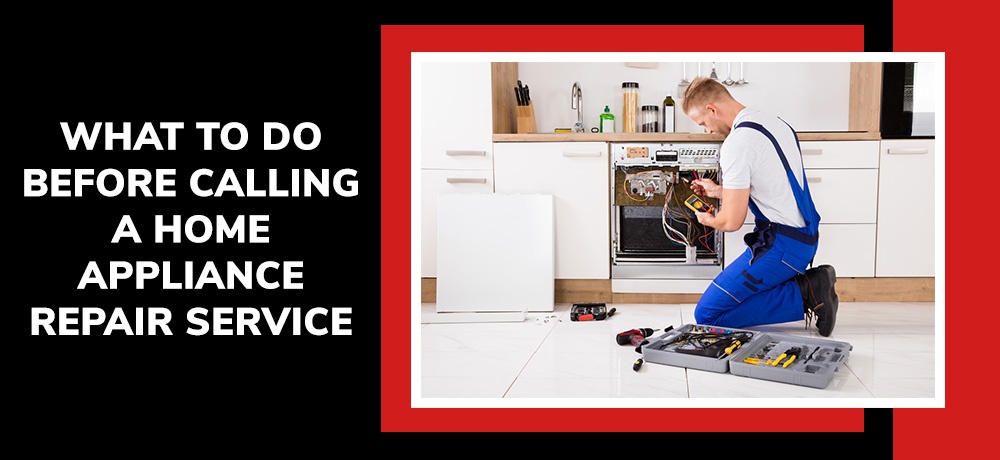What To Do Before Calling A Home Appliance Repair Service

The use of advanced home appliances has made a lot of things easier for us. Today, we can perform a variety of household chores in no time, thanks to these gadgets. Home appliances help us in several ways. These machines are efficient and can do multiple tasks in no time. However, these machines sometimes behave erratically or refuse to work at all. This is very common when it comes to electronics. To get them fixed and working right, the services of an appliance repair company are in order.
But, before you contact a home appliance repair service, try to see if the issue is something you can fix yourself. In many cases, the issue can be solved by simply checking the power source, the method of usage, or your electrical panel. If the reason why your appliance isn’t working has nothing to do with the appliance, you will have to unnecessarily pay the repairperson for coming out to your place.
To help you determine if you need to call a repair service, S.V. Appliance Repair has made a list of what to do before calling the home appliance repair service. If these fail to get your appliance working, you will need to contact a repair service.
Tip #1: Unplug and replug your appliance
Unplug the household appliance that is being problematic for about ten minutes and then plug it in again and turn it on. This procedure will help the appliances to reboot. Often, that’s all it takes to solve the problem. Unplugging something usually works because many consumer-tech devices, like cable modems, routers, and streaming TV boxes, have tiny computers inside them. Unplugging then plugging appliances back in forces the tiny computers in them to restart and clear any temporary software problems.
Tip #2: Place your appliances appropriately
Some appliances may refuse to work properly if placed on an uneven surface or if their filters become clogged and overheat. Without proper air circulation, electrical equipment can overheat and short out and become an electrical fire hazard. So, make sure your appliances have adequate air circulation and avoid running electrical equipment in enclosed cabinets. For best electrical safety, it’s also important to store flammable objects well away from all appliances and electronics. Keeping electrical equipment dry and away from water to prevent damage to them and protect yourself against personal injury and electrocution.
Tip #3: Check your hoses regularly
The washing machines and dishwashers have hoses for water to pass through. These hoses can wear out and eventually burst. If a leak or kink occurs, you need to check these hoses and connections. Pay attention to the condition of these hoses as they tend to wear out before other components. At a minimum, check the hoses once or twice a year. Dishwasher leaks can easily go undetected, so it’s essential to check these connections regularly as well. Make sure that the hoses and lines have no kinks, and periodically remove and clean the filter in the dishwasher, which is designed to stop food pieces from making it into the drain hose.
Tip #4: Look up appliance error codes
Error codes are a perk and frustration to owning a modern-day appliance. Error or fault codes are your appliances’ way of letting you know something is wrong. The most common way to find what a fault code means is to simply look it up in your appliance’s manual. Sometimes the codes lead to a quick fix like disconnecting and reconnecting the appliance. Other codes may mean you need to replace a part. Look up appliance error codes and determine if you can fix it yourself or not.
Tip #5: Check your breaker panel
The fuses or circuit breakers in your home’s electrical system are there for a purpose, to blow or trip if the circuit is overloaded. Check your breaker panel first if the appliance does not turn on. If there is a fuse blown, check to see which one it is, then disconnect everything connected to the faulty circuit. Then you either replace the fuse or reset the breaker. If the new fuse blows or the circuit breaker refuses to reset, the problem lies in either the equipment that’s still connected or in the circuit cable itself. Check the still-connected items, examining each for faults until you find the offending equipment. If the circuit still goes out when there are no loads connected to it, the wiring is faulty, probably due to a short in a junction or receptacle box or in the cable itself. If you suspect faulty electrical wiring, then call an electrician.
If you are looking for appliance repair technicians in London, Ontario, then reach out to us at S.V. Appliance Repair. We are committed to providing excellent customer service to everyone, which includes: domestic appliance repairs and installations. We are confident in what we do, which is why we offer three months warranty on every repair. No matter the make or model of the appliance, we can help! We install and repair washing machines, dryers, fridges, dishwashers, electric stoves and ovens, and so much more. We serve clients across London, Komoka, St. Thomas, Woodstock, Muncey, Lucan Biddulph, Fingal, Strathroy, Ingersoll, Saint Marys, Aylmer, Blanshard, Sparta, Port Stanley, Centralia, Parkhill, Downie, Crediton, Denfield, Tillsonburg, Exeter, Glencoe, South Easthope, Stratford, Byron, Kitchener, Waterloo, and the surrounding areas. To learn more about the services we offer, please click here. To get in touch with us, please click here.